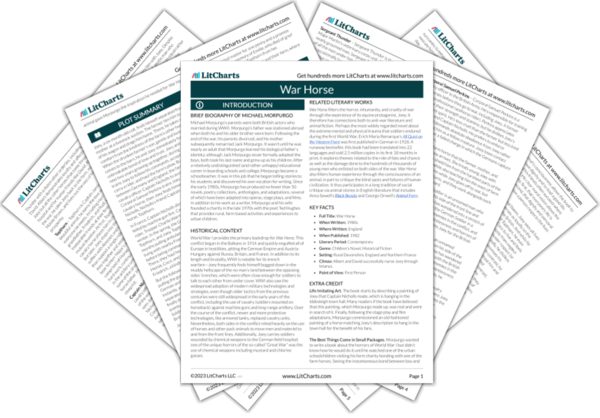David Quotes in War Horse
Albert suddenly dropped my tail and moved slowly around me running his hand along my back. Then at last we stood facing each other. There was a rougher hue to his face, I thought; he had more lines around his eyes and was a broader, bigger man in his uniform than I remembered him. But he was my Albert, and there was no doubt about it […].
“Joey?” he said, tentatively, looking into my eyes. “Joey?” I tossed up my head and called out to him in my happiness, so that the sound echoed around the yard […]. Then he turned and walked away to the gateway before facing me, cupping his hands to his lips and whistling. It was his own whistle, the same low, stuttering whistle he had used to call me [before].
David spoke up now in support. “Begging your pardon, sir,” he said. “But I remember you telling us when we first came here that a horse’s life is maybe even more important than a man’s, ’cause a horse hasn’t got no evil in him except any that’s put there by men. I remember you saying that our job in the veterinary corps was to work night and day, twenty-six hours a day if need be to save and help every horse that we could, that every horse was valuable in himself and valuable to the war effort. No horse, no guns. No horse, no ammunition. No horse, no cavalry. No horse, no ambulances. No horse, no water for the troops at the front. Lifeline of the whole army, you said, sir. We must never give up, you said, ’cause where there’s life there’s still hope. That’s what you said, sir, begging your pardon, sir.”
That’s what they said it was—one stray shell out of nowhere and he’s gone. I will miss him, Joey. We’ll both miss him, won’t we? […] You know what he was, Joey, before the war? He had a fruit cart in London, outside Covent Garden. Thought the world of you, Joey. Told me often enough. And he looked after me, Joey. Like a brother he was to me. Twenty years old. He had his whole life ahead of him. All wasted now, ’cause of one stray shell. He always told me, Joey. He’d say, ‘At least if I go, there’ll be no one that’ll miss me. Only my cart—and I can’t take that with me, and that’s a pity.’ He was proud of his cart, showed me a photo of himself standing by it.

David Quotes in War Horse
Albert suddenly dropped my tail and moved slowly around me running his hand along my back. Then at last we stood facing each other. There was a rougher hue to his face, I thought; he had more lines around his eyes and was a broader, bigger man in his uniform than I remembered him. But he was my Albert, and there was no doubt about it […].
“Joey?” he said, tentatively, looking into my eyes. “Joey?” I tossed up my head and called out to him in my happiness, so that the sound echoed around the yard […]. Then he turned and walked away to the gateway before facing me, cupping his hands to his lips and whistling. It was his own whistle, the same low, stuttering whistle he had used to call me [before].
David spoke up now in support. “Begging your pardon, sir,” he said. “But I remember you telling us when we first came here that a horse’s life is maybe even more important than a man’s, ’cause a horse hasn’t got no evil in him except any that’s put there by men. I remember you saying that our job in the veterinary corps was to work night and day, twenty-six hours a day if need be to save and help every horse that we could, that every horse was valuable in himself and valuable to the war effort. No horse, no guns. No horse, no ammunition. No horse, no cavalry. No horse, no ambulances. No horse, no water for the troops at the front. Lifeline of the whole army, you said, sir. We must never give up, you said, ’cause where there’s life there’s still hope. That’s what you said, sir, begging your pardon, sir.”
That’s what they said it was—one stray shell out of nowhere and he’s gone. I will miss him, Joey. We’ll both miss him, won’t we? […] You know what he was, Joey, before the war? He had a fruit cart in London, outside Covent Garden. Thought the world of you, Joey. Told me often enough. And he looked after me, Joey. Like a brother he was to me. Twenty years old. He had his whole life ahead of him. All wasted now, ’cause of one stray shell. He always told me, Joey. He’d say, ‘At least if I go, there’ll be no one that’ll miss me. Only my cart—and I can’t take that with me, and that’s a pity.’ He was proud of his cart, showed me a photo of himself standing by it.











